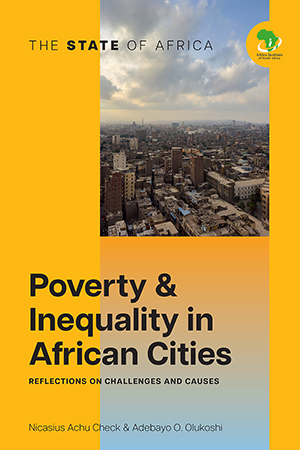BOOKS
Population Growth and Environmental Degradation in AfricaEzekiel Kalipeni, editor Population growth and environmental degradation are becoming increasingly important, and intertwined, issues in Southern Africa. The authors of this book warn that unless population growth is forestalled, the number of people in the region is likely to double in less than thirty years—placing enormous pressures on available farmland, job creation, shelter, educational systems, public More > |  |
Post-School Education and the Labour Market in South AfricaMichael Rogan In South Africa—with one of highest rates of youth unemployment and one of the most unequal societies in the world—training and education play critical roles in helping young people escape poverty and unemployment. Within this context, offering insights about the ways that young South Africans navigate through a host of postschool training and education options, the contributors to More > |  |
Postconflict Development: Meeting New ChallengesGerd Junne and Willemijn Verkoren, editors With the proliferation of civil wars since the end of the Cold War, many developing countries now exist in a "postconflict" environment, posing enormous development challenges for the societies affected, as well as for international actors. Postconflict Development addresses these challenges in a range of vital sectors—security, justice, economic policy, education, the media, More > |  |
Postconflict Elections, Democratization, and International AssistanceKrishna Kumar, editor On the Humanitarian Times list of the Top Ten Books of 1998! With the resolution of intrastate conflicts in Africa, Central America, and Southeast Asia, and with new hope for the peaceful settlement of many still-existing conflicts, attention is turning to the issue of “free and fair” elections. This book examines the nature of postconflict (transition) elections, as well as the role More > |  |
Poststructuralism and International Relations: Bringing the Political Back InJenny Edkins Offering a sophisticated introduction to the major poststructuralist thinkers, this book shows how Foucault, Derrida, Lacan, and Žižek expose the depoliticization found in conventional international relations theory. Edkins argues that, contrary to the opinions of their detractors, the poststructuralists are concerned with the big questions of international politics: it is precisely More > |  |
Poverty and Development in Latin America: Public Policies and Development PathwaysHenry Veltmeyer and Darcy Tetreault, editors Why, despite some five decades of international development efforts, is poverty still so widespread in Latin America? More specifically, what are the root causes of poverty? How can it be overcome? What meaningful progress has resulted from the "war against poverty"? Through a critical analysis of public policies and development pathways, the authors of Poverty and Development in Latin More > |  |
Poverty and Inequality in African Cities: Reflections on Challenges and CausesNicasius Achu Check and Adebayo O. Olukoshi, editors Rapid population growth, poor infrastructure, and inadequate housing markets, all combined with haphazard urban planning, have created unprecedented levels of poverty and inequality in Africa's metropolitan areas. In this context, the contributors to Poverty and Inequality in African Cities investigate the challenges facing those who move away from rural areas to the continent's cities More > |  |
Poverty and Inequality: Diagnosis, Prognosis, ResponsesCrain Soudien, Vasu Reddy, and Ingrid Woolard, editors Can the interconnected problems of poverty and inequality in South Africa be explained in ways that are distinctive from those that apply in other contexts and countries? How can efforts to solve these problems fruitfully move forward? Is taxation on wealth the answer? Addressing these and related questions, the authors provide a textured understanding of the multiple issues involved. More > |  |
Power and Security in Northeast Asia: Shifting StrategiesByung-Kook Kim and Anthony Jones, editors As China's influence rises and the US attempts to retain its primacy in Northeast Asia, the countries of the region are reconsidering their own security needs—and availing themselves of new opportunities. Power and Security in Northeast Asia explores the complexities of current security strategies in the region, revealing motivations and policies not often considered by traditional More > |  |
Power and Succession in Arab Monarchies: A Reference GuideJoseph A. Kéchichian Power and Succession in Arab Monarchies provides an essential compendium of information regarding the politically charged issue of succession in Bahrain, Jordan, Kuwait, Morocco, Oman, Qatar, Saudi Arabia, and the United Arab Emirates. Based on scarce source material and a wide range of inside information, this exhaustive reference: traces the rise of each ruling family outlines key More > |  |







